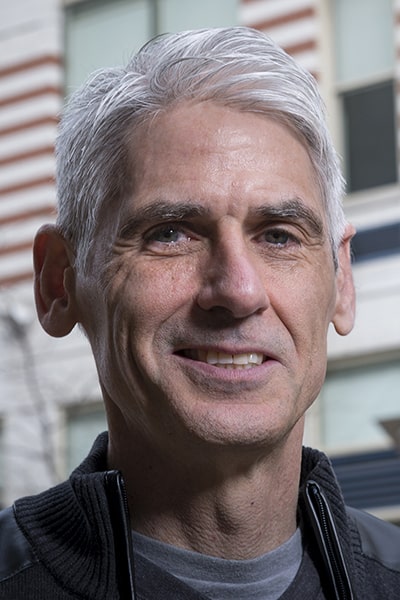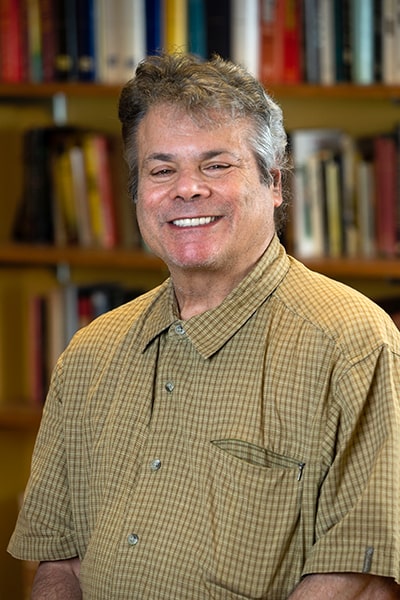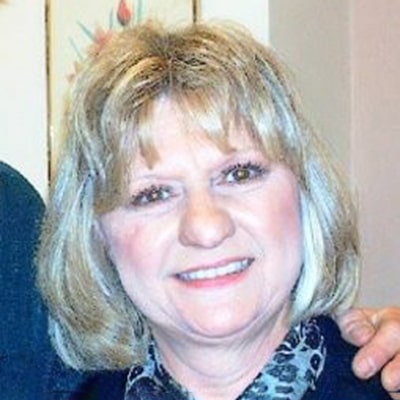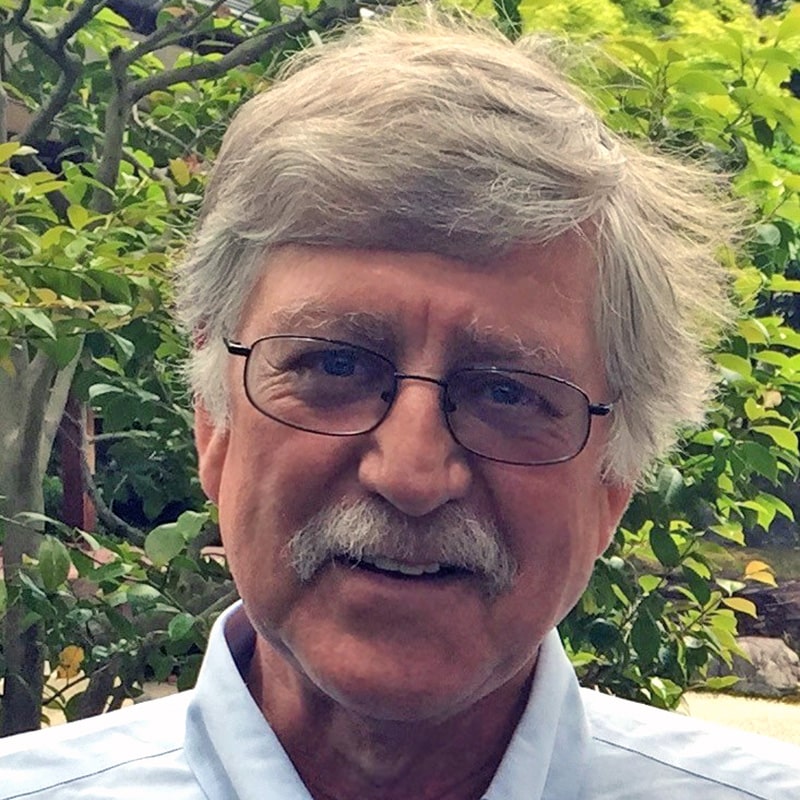Retiring Faculty, Staff Share Memories
By Abby Simmons
The five members of the Dietrich College of Humanities and Social Sciences who are retiring at the conclusion of the 2020-2021 academic year have made significant, long-lasting contributions to their fields, mentoring countless students over the course of their careers.
Those retiring this year include four faculty members: Jim Daniels, David Kaufer and Kristina Straub from the Department of English and Michael Scheier from the Department of Psychology. In addition, staff member Jan Puhl will retire from the Department of Philosophy.
Below, department heads reflect on our faculty and staff members’ contributions to the Dietrich College community. Retiring faculty and staff members also share what they will remember most about their time at CMU and/or within their department.
Department of English
“Our colleagues who retired at the end of this academic year have had long and rewarding careers in the English Department. Over the decades they have taught multiple generations of students whose subsequent professional success was in large part inspired and nurtured by these dedicated teachers. They have been productive and impactful scholars who also balanced administrative service with their intellectual passions. The English Department would not be what it is without their longstanding presence,” said Andreea Ritivoi, William S. Dietrich Professor and head of the Department of English.
 Jim Daniels
Jim Daniels
Thomas Stockham Baker University Professor of English
“I am most grateful to all of my students, from whom I learned so much over the years. I am also grateful for the friendship and support from the staff in the English office and across the university,” Daniels said.
Read Daniels’ bio
Jim Daniels taught and developed poetry, fiction and screenwriting throughout his 40 years in the Department of English. His poems have been displayed on the roof a racecar and sent to the moon as part of the MoonArk Project. He founded CMU’s Martin Luther King, Jr. Day Writing Awards in 1999 and directed the competition for Pittsburgh-area high school and college students through 2020. He received numerous awards from CMU, including the Ryan Award for Excellence in Teaching, the Mark Gelfand Service Award for Educational Outreach, the Elliott Dunlap Smith Award for Teaching and Educational Service, and a Faculty Service Award from the Carnegie Mellon Alumni Association.
Daniels’ recent books include “The Middle Ages,”> “Street Calligraphy,” “Rowing Inland,” “The Perp Walk” and “Eight Mile High.” He has written four produced screenplays, including, most recently, “The End of Blessings.” In addition, he has collaborated with the photographer Charlee Brodsky on numerous gallery shows and publication projects, including their book, “Street,” which won the Tillie Olsen Prize. Daniels has received the Brittingham Prize for Poetry, two fellowships from the National Endowment for the Arts and two from the Pennsylvania Council on the Arts.
 David Kaufer
David Kaufer
Mellon Distinguished Professor of English
Director of Rhetoric Program
“The generation of faculty (Richard Young, Erwin Steinberg, Rich Enos, Preston Covey, John Lehoczky, Lois Fowler, Earl Swank, Tony Penna, Dan Boyarski, Dick Hayes, Peggy Knapp) who eased my way into the university and who since left, retired or passed. The generations of faculty and students following me whose way I’ve tried to ease in the transition from newbie to old-timer. The expansion and beautification of the campus physical plant. The great deans and department heads I served with during my years as head,” Kaufer said.
Read Kaufer’s bio
David Kaufer is retiring after 40 years with the Department of English, including 15 years of service as department head. He has published four books, four textbooks and over 100 refereed articles on text analysis, rhetorical analysis, writing theory, and writing and technology.
Kaufer’s research focuses on digital approaches to text analysis and collaboration. He has built large-scale digital dictionaries (the DocuScope default Libraries) to analyze and assess writing that have been used by the ETS, RAND, the Folger Shakespeare Library and the Stanford Literary Lab. Researchers from the English Department and the Computer Visualization Lab of the University of Wisconsin received a Mellon grant specifically to make it possible for textual researchers worldwide to run his dictionaries in their various research projects. With Ananda Gunawardena of Princeton University’s Computer Science Department, Kaufer also co-invented Classroom Salon, a web-based application used to support textual annotation and collaboration in the humanities and STEM fields. That project currently has 20,000 users and has received support from the Heinz Endowments, National Science Foundation, the Gates Foundation and Google. In addition to being a descriptive expert in the rhetorical patterns of English writing, Kaufer is an expert in the normative principles underlying effective written communication and has written three textbooks on the subject.
In his retirement, Kaufer looks forward to more time to write, lecture abroad and let ideas incubate. He intends on staying close with the Department of English’s writing programs.
 Kristina Straub
Kristina Straub
Professor of English
“There are two events, among many, that rise first to my memory. First is the incredibly focused and productive collaboration between humanities faculty that led to the design of the Humanities Scholars Program in Dietrich College. Working with Wendy Arons in the School of Drama under the Direction of James Duesing in the School of Art to direct a three-year initiative for the Center for the Arts in Society on the broad theme of performance led to some amazing experiences. Notably, Larry Shea’s technological magic in a deconstructed “Wizard of Oz,” Edda Fields-Black’s collaboration with musicians and artists to produce the moving “Requiem for Rice,” and the many powerful critical, pedagogical and artistic productions of Jennifer Keating and John Carson for their “Performing Peace in Northern Ireland” project. What most stands out from this experience is the raucously wonderful evening that Wendy and I hosted for the Drama Queens, six feminist performance artists from two generations, who turned the Raugh Theater into the perfect venue for good trouble,” Straub said.
Read Straub’s bio
Kristina Straub was a Department of English faculty member for 33 years, studying, teaching and writing about feminist cultural studies, sexuality studies, performance studies and 18th-century British cultural studies. She is the author of three books — “Domestic Affairs: Intimacy, Eroticism and Violence Between Servants and Masters in Eighteenth-Century Britain,” “Sexual Suspects: Eighteenth-Century Players and Sexual Ideology,” and “Divided Fictions: Fanney Burney and Feminine Strategy” — and dozens of articles. In 2016, Straub co-curated the exhibit “Will & Jane: Shakespeare, Austen, and the Cult of Celebrity” at the Folger Shakespeare Library with University of Texas at Austin’s Janine Barchas. Most recently, she investigated the confluence of a growing commercial culture of public knowledge, in which the theater and periodical press play key roles, with the decline of English universities from 1660 to 1770.
A recipient of Dietrich College’s 2021 Elliott Dunlap Smith Award for Distinguished Teaching and Educational Service, she has appreciated how interactions with her students have kept her intellectually alert, honest and attuned to the importance of making “academic” issues matter to how we think about and live our lives. This year, she also received the American Society for 18th Century Studies Graduate Student Caucus Excellence in Mentorship Award.
In retirement as in her career, Straub looks forward to collaboration with other scholars and artists. She is part of the R/18 Collective, an international group of scholars dedicated to bringing 18th-century drama to the 21st-century stage. In addition, she is writing a book on the development of public knowledge in 18th-century Britain through a variety of popular entertainment forms, including musical theater, oratory and the commercial display of technological innovations. Straub is looking forward to relaxed time with family and friends, and she is eager to return to an early and on-going passion for drawing.
Department of Philosophy
 Jan Mary Puhl
Jan Mary Puhl
Senior Academic Coordinator
“Jan Puhl has guided generations of graduate students through the Department of Philosophy. She has always been ready to help, ready to laugh and ready to contribute. She will be missed around Baker Hall every day,” said David Danks, head of the Department of Philosophy and the L.L. Thurstone Professor of Philosophy and Psychology. Prior to 1998, Puhl worked in Computing Services, first with the accounts and IT billing teams, then in user support.
“Jan Puhl is one of the sweetest, most generous people I've ever met,” said Richard Scheines, Bess Family Dean of the Dietrich College and former head of the Department of Philosophy. “Jan was absolutely fabulous to our graduate students, but she really loves dogs, and my dog Maggie loved her. At a certain point I had to go on a long trip, and Jan offered to take Maggie home and add her to the Puhl family (which included two other dogs, of course) for the duration. Maggie had such a good time that she wasn't sure if she wanted to come back to my house, or make Jan her permanent ‘mom.’ I was kind of glad she couldn't talk and tell me how much better Jan was as a caregiver than me!”
“I never thought it would be so hard to retire from CMU, saying goodbye to all the people that I work with in the Department of Philosophy as well as the college. I feel very fortunate to have worked with such awesome faculty, staff and students, and I will truly miss them. I have very fond memories to hold dear to my heart, so many I cannot mention them all, and I thank each and every one of you for that. Thank you, Department of Philosophy, for all the support you showed me throughout the years and to Dietrich, it’s been an honor and a privilege,” Puhl said.
Read Puhl’s bio
Jan Puhl is retiring after 42 years of service to CMU. Most recently, she worked with the Department of Philosophy’s graduate students, supporting them from the application process through graduation and beyond. In addition to playing a major role in planning the department’s commencement ceremonies, Puhl kept in touch with alumni, gathering information on their successes and helping them to obtain letters of recommendation. Her colleagues remember her for her dedication to CMU, precise record-keeping and many moments filled with laughter.
Puhl plans to spend much of her time in retirement enjoying nature, biking, hiking and walking her two flat-coated retrievers with her family. She also looks forward to traveling and spending time with her extended family.
Department of Psychology
 Michael Scheier
Michael Scheier
Walter van Dyke Bingham Professor of Personality and Health Psychology
“Mike has always struck me as the consummate scholar who thinks beyond his own areas of research — asking trenchant questions about topics far afield from his own expertise in social and personality psychology (fields in which he has made a major impact). Mike was also the head of our department for over 10 years and has been a great sounding board, helping me immensely in understanding and thinking about strategic issues,” said Michael J. Tarr, head of the Department of Psychology and the Kavčić-Moura Professor of Cognitive and Brain Science.
“The Department of Psychology was expanding around the time that I was hired. A substantial number of new, younger faculty were added in the few years preceding and following my arrival. What I will remember most is growing professionally along with this group across the years. My colleagues were an unusually talented group and always inspired and energized the work that I did,” Scheier said.
Read Scheier’s bio
Michael Scheier is retiring after 46 years in the Department of Psychology, which included more than 10 years as department head. His research builds on his interest in human motivation and examines problems in effective self-management. Scheier seeks to understand what happens when people encounter difficulties in their lives trying to attain the things they want — or avoid the things they don't want. He has examined the role that dispositional optimism, purpose in life and adjustment abilities play in dealing with stressful life circumstances. In other recent research, he has explored individual differences in goal disengagement and goal re-engagement processes and has tried to understand how such differences impact adjustment to chronic diseases that become progressively worse over time. He has co-authored two research monographs and a textbook on personality, as well as more than 200 chapters and empirical papers.
Scheier is a fellow of the American Psychological Association (APA), which presented him and his long-time collaborator, Charles S. Carver, with its Distinguished Scientific Contribution Award in 2018. He previously served as president of the APA’s Health Psychology Division and received the association’s awards for Outstanding Contributions to Health Psychology and the Donald T. Campbell Award for distinguished lifetime contributions to social psychology. Scheier also is a fellow of the Society of Behavioral Medicine and a member of the Academy of Behavioral Medicine Research.
In retirement, Scheier is planning to travel with his wife around the world (as the pandemic allows) and spend more time on the water fly fishing. He’s also looking forward to not feeling guilty about turning down journal editors who request reviews.